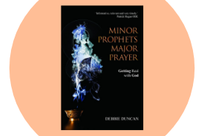A relatively new name in Biblical Fiction, Joan Wolf has written more than 40 novels including historical series spanning prehistory, the dark ages and the medieval period. Now her retellings of Esther (A Reluctant Queen), Rahab (This Scarlet Cord) and Mary Magdalene in her soon to be released Daughter of Jerusalem are powerful introductions to the world of biblical fiction.

Joan Wolf with one of her dogs, Penny.
Joan's latest biblical retelling has its focus, as you might expect, in themes of forgiveness and redemption.
In retelling Mary Magdalene’s story from the very sketchy outlines and hints given in the gospels, the author has had to create an engaging plot and colour in the personalities of the main characters in the story.

Historical Facts or Eternal Truths?
For historical purists, biblical retelling is akin to tampering with the evidence. For those more interested in eternal truths than knowledge that passes away, this kind of exploration through the imagination of a skilled writer brings fresh understanding and a new perspective on sometimes over familiar and prejudged issues.
Though Joan has mined the whole of human history for the source material of her impressive back catalogue of over 40 novels, she turns to the Bible for redeeming and restorative narratives that have meaning and influence in our own times.

From the Bronx, to Books and the Bible
Of course Joan’s life and background colour her interpretation of the words and actions of her biblical subjects. For nine years she taught English following her formative years growing up in the Bronx district of New York City. Now aged 62 and a mum of grown up children, the novelist runs her church’s food bank with her husband.
Claiming no particular favourite, she recalls her first reading book as Black Beauty, which started her on horse and baseball stories until the romantic-suspense writings of Mary Stewart and Victoria Holt took over in her teenage years.
As a young woman, Joan was a huge fan of Georgette Heyer and Dorothy Dunnett’s ‘Lymond’ series, though now she finds herself turning more and more to books of a spiritual nature. Garry Wills’ book What Jesus Meant has had a profound effect upon her, she says.

Honest, Sympathetic, Imaginative Portayals
Authors such as Joan, and others including Francine Rivers, Mesu Andrews and Diana Wallis Taylor help us look at scripture with a fresh pair of eyes and renewed sense of purpose. However, it is important to remember that these are only story tellers. The Bible's real truth is only proved through first hand experience. I don’t think any Bible based novelist would disagree about that.
That said, Joan Wolf’s years of success as a novelist enable her to combine both the engagement of storytelling and the authenticity of faith in a plot that’s truthfully based – though not factual bound in the biblical narrative, and with characters that are honestly and sympathetically portrayed, though not locked up in conventional imagery.
Joan Wolf’s biblical novels, including her latest Daughter of Jerusalem - recounted through a first person narrative, may deviate historically but compensate with a universally understood message of forgiveness and redemption likley to be most appreciated by readers new to Biblical Fiction, giving established readers an ideal gift opportunity.
To explore this popular genre further, read our blog article - 7 Reasons To Try Biblical Fiction - featuring all the reasons we love biblical fiction and the must-read books we thoroughly recommend. Or if you still need some convincing, read our blog article - Biblical Fiction: Truth or Nothing Like the Truth - where we ask the genre some tough questions.






